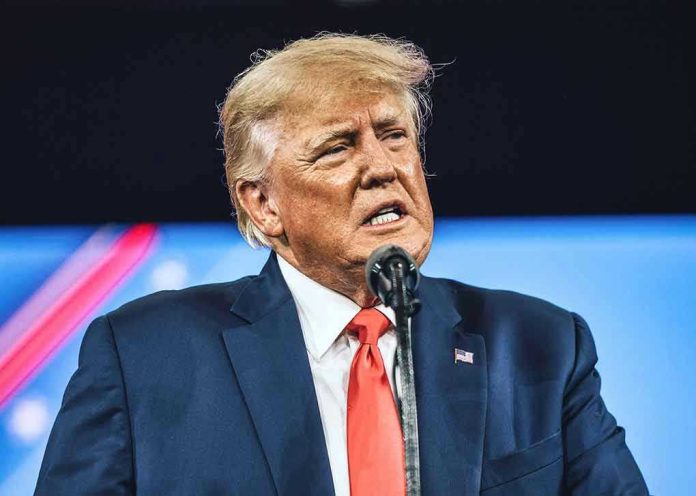
As the Trump administration weighs letting Nvidia sell a downgraded Blackwell AI chip to China, concerns mount that America’s edge in the global tech race—and its national security—could be at stake.
Story Snapshot
- Nvidia CEO Jensen Huang confirms talks with Trump officials about selling a less advanced Blackwell AI chip to China.
- Trump signals openness to a conditional deal, reversing prior blanket bans and sparking debate over U.S. interests.
- Security hawks warn that even downgraded chips could help China narrow the AI gap and threaten U.S. technological superiority.
- Ongoing negotiations highlight the struggle to balance economic gains with safeguarding national security and conservative values.
Trump Administration Reconsiders Export Controls on AI Chips
In August 2025, Nvidia CEO Jensen Huang publicly stated that discussions have begun with the Trump administration about potentially selling a scaled-down Blackwell chip—a next-generation AI processor—to Chinese firms. This marks a significant shift from prior U.S. policy, which enforced strict bans on advanced chip exports to China, citing fears of boosting Chinese military and surveillance capabilities. Trump indicated that he might allow sales if the chips are 30–50% less powerful and if the U.S. secures appropriate compensation, drawing a sharp contrast with previous blanket restrictions.
Previous U.S. export controls, implemented under both Democrat and Republican leadership, targeted Nvidia’s A100, H100, and H20 chips, aiming to stymie China’s rapid advances in AI and supercomputing. These restrictions, however, also hurt American firms by cutting off access to the massive Chinese tech market. The Trump administration’s willingness to negotiate a conditional deal reflects a new strategy—seeking to preserve U.S. commercial interests while attempting to maintain a technological edge. The outcomes of these talks could reshape the way U.S. technology is leveraged in the global AI race.
National Security Versus Economic Interests
The debate at the heart of these negotiations centers on whether to prioritize national security or economic prosperity. Proponents of allowing limited exports argue that keeping China dependent on U.S. technology strengthens American influence and oversight. Jensen Huang insists that widespread adoption of U.S. chips globally will help America win the AI race by embedding American standards and platforms at the core of the world’s most important technological infrastructure. On the other side, security hawks caution that even downgraded chips could be reverse-engineered or used to accelerate China’s homegrown semiconductor industry, ultimately eroding America’s lead and threatening both security and economic dominance.
This policy crossroads mirrors past U.S. decisions to allow sales of downgraded military hardware to allied and non-allied countries, always with restrictive covenants. The difference now is the dual-use nature of AI chips: they can empower everything from consumer apps to advanced surveillance and military systems. The Trump administration must weigh the risk of enabling potential adversaries against the risk of driving those same adversaries to build their own alternatives, which could be even harder to monitor or control in the future.
Industry Impacts and Conservative Concerns
If a deal is reached, Nvidia’s revenues could surge, helping sustain a core American industry and supporting U.S. jobs—a priority for many conservatives. However, there is legitimate concern that relaxing export controls, even under strict conditions, might set a precedent that weakens future safeguards. China’s domestic chipmakers, such as Cambricon, have already benefited from past bans, with revenues surging as Chinese firms scramble to reduce reliance on U.S. technology. For conservatives, this story is not just about dollars and cents; it’s about defending American leadership, protecting constitutional values, and ensuring that economic policy does not inadvertently arm competitors who do not share America’s ideals.
Limited data is available on the final shape of the agreement, as talks remain ongoing and deeply contentious. What is clear is that the Trump administration’s approach represents a pragmatic, but high-stakes, gamble. The outcome will likely influence not only the balance of power in AI, but also the broader debate over how America defends its interests and values in an era of relentless global competition. Readers concerned about U.S. sovereignty, industrial strength, and constitutional protections should monitor these negotiations closely.
Expert Perspectives and the Road Ahead
Experts remain divided on the wisdom of any deal that gives China access to American-designed AI hardware, even in restricted form. Some analysts warn that strict containment may accelerate China’s domestic tech sector, while others argue that managed exports maintain leverage and oversight. The historical precedent of selling downgraded technology offers some reassurance, but the unique risks posed by AI chips mean this debate is far from settled. As the Trump administration navigates these waters, it faces intense scrutiny from both national security advocates and free market champions. The stakes—for American security, prosperity, and global leadership—could not be higher.
Sources:
Trump Nvidia talks to allow Blackwell chip sales to China will take time, CEO says
Nvidia CEO says he’s in talks with Trump admin about selling Blackwell chip to China







